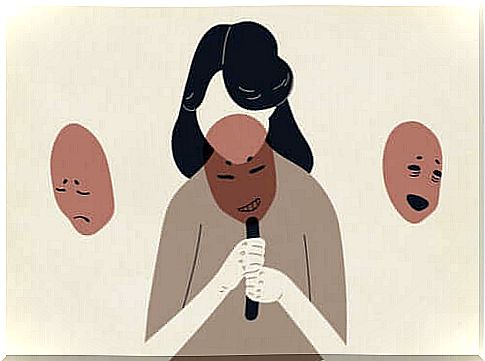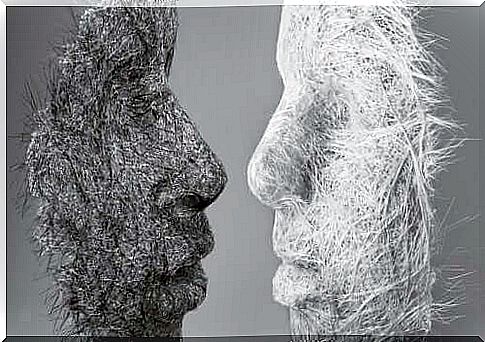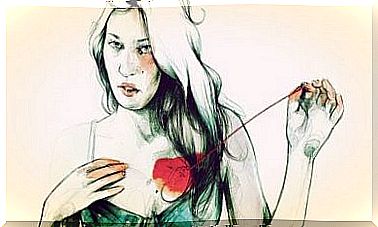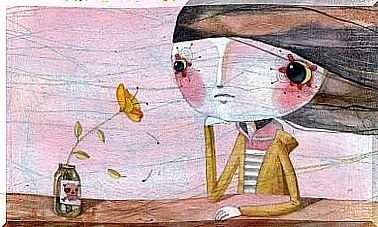Victim, Prosecutor And Savior: Three Existential Positions

Psychologist Stephen Karpman raised the idea that so-called manipulation mechanisms, which Karpman called “control play,” are often introduced in unnatural human relationships. Participants in this play basically end up assuming three existential roles or positions: victim, prosecutor, and savior.
These existential positions are typical of human relationships that have neither authenticity nor truth-based bonding, but are, strictly speaking, a game of mutual control. This play prevents us from seeing who we really are and who others are. The victim, the prosecutor, and the savior are masks that cover our desire not to grow.

Definitions of victim, pursuer, and savior
Each of these existential positions, according to Karpman, has certain characteristics. In this way, the victim, the prosecutor, and the rescuer show more or less stable patterns of behavior, and which, as mentioned earlier, do not eliminate the fact that they can also vary and interact with each other. Each has the following features:
- Victim. Respond to those people who treat others by adopting an attitude of helplessness. They don’t know, they can’t, they don’t succeed. They are constantly seeking the help and support of others, but at the same time they are complaining about their own situation. They transfer their own responsibility to the shoulders of others.
- Prosecutor. The prosecutor is the one who stays on the edge of the situation – or at least he gives the impression of it. These people criticize others and they take it extremely seriously. They show others their own mistakes and in a way enjoy the emotional suffering it causes in others.
- Savior. This is related to an attitude that is characterized by taking on the responsibilities of others. Saviors offer false help because their contribution does not help others grow, but, on the contrary, merely increases the dependence of others.
The Karpman Drama Triangle: Victim, Prosecutor, and Savior
The victim, the prosecutor, and the savior are masks that also have the other side. For example, the victim may end up manipulating and exploiting others, protected by his or her presumed helplessness. At the same time, it nurtures his sense of worthlessness and insecurity. The victim thinks he deserves absolute understanding because he is devoid of something. Such a person easily becomes an aggressive party as well.
The prosecutor, in turn, turns his own frustration on others. He strives for others to give him a certain dominance or meaning through which he can become a judge of others. He learns to elevate himself to a prominent position in front of others through his own cruelty and intimidation. Usually, such people become very cowardly when faced with their own fears.
The Savior, who seems to be the Most Kind in this drama triangle, again longs for others to need him. However, his help is not selfless. He also feels insignificant and strives to make others dependent on him to feel recognized or to win the affection of others. However, he complains about how he sometimes feels exploited. Through this, the savior easily assumes the position of victim.

How to get out of control play
Although the play of control between the victim, the prosecutor and the rescuer usually becomes a structural situation, it is possible to get out of it. However, it is clear that it requires honesty with oneself as well as a desire to form more real ties with other people. Fortunately, the functioning of these three dramatic roles can be transformed into healthier attitudes. Examples of these:
- Providing empathic cooperation instead of saving. It is not about dealing with other problems, but about being able to identify your own shortcomings and difficulties and help the other person to overcome them yourself. In other words, gaining greater trust and independence rather than giving them up.
- Increasing self-confidence instead of blaming. What the prosecutor lacks is stopping staring at other people and turning his gaze to himself. It can be an example of autonomy insofar as it contains the seed of self-confidence. It is the ability to set boundaries, even if it is not quite as easy to respect the boundaries set by others.
- Taking responsibility instead of being a victim. Instead of just waiting for the victim to be rescued, he must focus entirely on taking his own responsibility. He may need help, but in that case he should not be asked indefinitely and unconditionally. First you have to know how to help yourself.
These three existential positions form the so-called Karpman drama triangle. It is a triangle because it is made up of three peaks, namely the victim, the prosecutor and the savior, who are closely connected. One cannot live without the existence of others. In addition, roles may change. Therefore, for example, a victim can become a prosecutor, a prosecutor a savior and a savior a victim.









